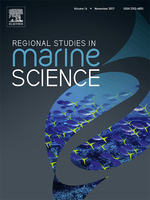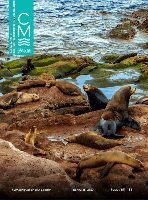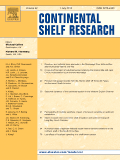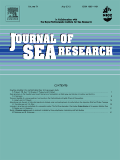
Regional Studies in Marine Science
Scope & Guideline
Unveiling Regional Dynamics in Marine Science
Introduction
Aims and Scopes
- Marine Ecosystem Dynamics:
Research on the interactions and processes within marine ecosystems, including the impact of physical and chemical factors on biodiversity and productivity. - Biodiversity and Conservation:
Studies focused on the diversity of marine species and habitats, with an emphasis on conservation strategies and the effects of anthropogenic pressures. - Pollution and Ecotoxicology:
Research addressing the sources, distribution, and effects of pollutants, including microplastics and heavy metals, on marine organisms and ecosystems. - Climate Change Effects:
Investigations into how climate change impacts marine environments, including changes in temperature, sea level, and ocean acidification. - Fisheries Management and Economics:
Research on sustainable fishing practices, stock assessments, and the socio-economic implications of fisheries management. - Technological Innovations in Marine Research:
Application of advanced technologies such as remote sensing, GIS, and machine learning to study marine and coastal environments. - Ecosystem Services:
Assessment of the services provided by marine ecosystems, including their role in coastal protection, carbon sequestration, and supporting livelihoods.
Trending and Emerging
- Microplastic Research:
There is a significant increase in studies focusing on microplastics, their sources, distribution, and ecological impacts, reflecting growing public and scientific concern over plastic pollution. - Climate Change Adaptation Strategies:
Research on adaptive management strategies for marine ecosystems in the face of climate change is gaining traction, highlighting the need for resilience in marine conservation efforts. - Ecosystem-Based Management Approaches:
Emerging studies emphasize an integrated approach to managing marine resources, considering ecological, social, and economic factors. - Technological Integration in Marine Studies:
The use of advanced technologies such as remote sensing, machine learning, and genomic techniques is trending, facilitating more comprehensive marine research. - Sustainable Aquaculture Practices:
Research focusing on sustainable aquaculture practices and their environmental impacts is growing, driven by the need for food security and sustainable resource use. - Community Engagement in Marine Conservation:
Studies exploring the role of community engagement and participatory approaches in marine conservation and management are becoming more prevalent.
Declining or Waning
- Traditional Fisheries Studies:
Research focusing solely on traditional fishing practices has decreased, likely due to a growing emphasis on sustainable practices and ecosystem-based management. - Static Biodiversity Assessments:
Studies that provide only baseline biodiversity assessments without considering dynamic changes or threats have become less common as the field moves towards more integrative approaches. - Localized Environmental Studies:
Research that does not consider broader regional impacts or connections to global marine issues may be waning as interdisciplinary and collaborative research becomes more valued.
Similar Journals

GULF AND CARIBBEAN RESEARCH
Diving into the Future of OceanographyGulf and Caribbean Research is an esteemed academic journal published by the University of Southern Mississippi, dedicated to advancing the understanding of aquatic ecosystems in the Gulf of Mexico and the Caribbean region. With an ISSN of 1528-0470 and an E-ISSN of 2572-1410, the journal serves as an essential platform for researchers and professionals in the fields of Aquatic Science, Oceanography, and Water Science and Technology, recognized in the 2023 Q3 Quartile rankings across these disciplines. The journal welcomes diverse contributions including original research, reviews, and technical notes, encouraging interdisciplinary approaches to address ecological and environmental challenges within its scope. Despite the absence of an open access option, it provides invaluable insights, evidenced by its Scopus rankings, which position it within the 31st to 33rd percentile across various related categories. The engaging research articulated in Gulf and Caribbean Research fosters dialogue and collaboration, making it a vital resource for those committed to scientific discovery and conservation efforts in these critical aquatic environments.

Journal of Marine Science and Technology-Taiwan
Advancing marine innovation for a sustainable future.The Journal of Marine Science and Technology-Taiwan, published by Nant Taiwan Ocean University, is a pivotal academic platform dedicated to the advancement of knowledge in the fields of marine science and engineering. With an ISSN of 1023-2796 and E-ISSN 2709-6998, this journal spans a wide array of topics relevant to the study and application of marine technology from 1998 to 2024. It ranks in the Q3 quartile in major categories such as Mechanical Engineering, Mechanics of Materials, and Ocean Engineering, illustrating its growing influence and the breadth of research it encompasses. Although currently not an open access journal, it provides critical insights to researchers, professionals, and students alike, making significant contributions to the understanding of marine environments and technologies. As the journal continues to evolve, its commitment to high-quality, impactful research remains central to its mission, empowering scholars to drive innovation in the dynamic field of marine science.

Indian Journal of Geo-Marine Sciences
Innovating Insights into Marine Ecosystems and GeologyThe Indian Journal of Geo-Marine Sciences, published by the NATIONAL INSTITUTE OF SCIENCE COMMUNICATION & INFORMATICS (NISCAIR), serves as a vital platform dedicated to the dissemination and advancement of knowledge in the field of marine and geosciences. As an open-access journal, it allows for improved visibility and accessibility of research findings to a global audience, enabling researchers, professionals, and students to share insights into oceanography and related disciplines. With a publication history spanning from 2007 to 2010 and continuing from 2012 to 2024, it has established itself within the academic community as a reliable source of innovative research, despite being classified in Q4 of Oceanography and holding a Scopus rank that places it in the 27th percentile. This journal is particularly relevant for those investigating marine ecosystems, geological oceanography, and their interconnections, thus playing an essential role in fostering understanding and communication within this important area of scientific inquiry.

Ocean Science
Pioneering Open Access in Marine ScienceOcean Science, published by COPERNICUS GESELLSCHAFT MBH, stands as a premier Open Access journal in the fields of Oceanography and Paleontology, with a commendable impact factor that highlights its influence in the scientific community. Since its inception in 2005, Ocean Science has provided a vital platform for the dissemination of innovative research and discoveries, boasting prestigious rankings of Q1 in both Oceanography and Paleontology categories as of 2023, along with impressive Scopus rankings (7th in Paleontology and 28th in Oceanography). Based in Göttingen, Germany, the journal's commitment to open access ensures that groundbreaking research is readily available to a global audience, fostering knowledge sharing and collaboration among academics, professionals, and students alike. As it converges towards its 20th anniversary in 2024, Ocean Science continues to be an essential resource for those dedicated to advancing our understanding of the marine environment and its geological history.

Russian Journal of Marine Biology
Advancing Knowledge in Aquatic EcosystemsRussian Journal of Marine Biology, published by MAIK NAUKA/INTERPERIODICA/SPRINGER, serves as a vital platform for disseminating research in the fields of Aquatic Science and Oceanography. With an ISSN of 1063-0740 and E-ISSN 1608-3377, this journal has been in circulation since 1996 and continues to contribute valuable insights across its specified domains. Although it currently holds a Q4 quartile ranking in both fields as of 2023, the journal's impact is underscored by its focused niche in marine biology, attracting contributions from a diverse global research community. Researchers and professionals will find its articles essential for advancing their knowledge and understanding of marine ecosystems and biological processes. While not currently an open access journal, the Russian Journal of Marine Biology remains committed to enhancing the scientific discourse aimed at fostering sustainable marine environments.

CIENCIAS MARINAS
Connecting Scholars to the Ocean's SecretsCIENCIAS MARINAS, an influential journal in the field of Aquatic Sciences, is published by the Instituto de Investigaciones Oceanológicas of the Universidad Autónoma de Baja California. Established as an open access platform since 2006, it aims to disseminate original research and critical reviews that contribute to the advancement of marine science. With a commitment to fostering scholarly dialogue, CIENCIAS MARINAS serves as a vital resource for academics, researchers, and practitioners interested in the ecological dynamics and biological processes of aquatic environments. Although currently ranked in the fourth quartile in Aquatic Science by Scopus, the journal remains dedicated to increasing its visibility and impact within the research community. Housed in Mexico, it offers a regional perspective that underscores the importance of coastal and oceanic research, making it an essential avenue for exploring marine biodiversity and conservation efforts. By engaging with this journal, readers can stay abreast of the latest developments and contribute to the growing body of knowledge in marine sciences.

CONTINENTAL SHELF RESEARCH
Exploring the Depths of Marine KnowledgeCONTINENTAL SHELF RESEARCH, published by PERGAMON-ELSEVIER SCIENCE LTD, is an esteemed journal within the fields of Aquatic Science, Geology, and Oceanography, reflecting a compelling intersection of these disciplines. Since its inception in 1982, this journal has served as a premier platform for disseminating cutting-edge research relevant to the continental shelf ecosystem, including its geological features, biological resources, and physical processes. With a Category Quartile ranking of Q1 in Aquatic Science and prominent Q2 standings in Geology and Oceanography, it is recognized for its rigorous peer-review standards and impactful contributions, evidenced by its respective rankings in Scopus. Researchers and professionals are encouraged to engage with the journal's array of high-quality articles that not only enhance scientific understanding but also inform policy and conservation efforts. This dedication to advancing knowledge makes CONTINENTAL SHELF RESEARCH an essential resource for those passionate about marine and coastal studies in the United Kingdom and globally.

JOURNAL OF SEA RESEARCH
Connecting Science and Sustainability Beneath the WavesJOURNAL OF SEA RESEARCH, published by Elsevier, is a premier academic journal dedicated to advancing knowledge in the fields of aquatic science, ecology, and oceanography. Since its inception in 1996, this journal has provided a vital platform for researchers and professionals to disseminate groundbreaking findings and promote fostering interdisciplinary discussions. With its impressive Q2 ranking in multiple categories, including Aquatic Science and Ecology, Evolution, Behavior and Systematics, it positions itself as a significant contributor to marine and environmental studies. The journal is accessible in both print (ISSN: 1385-1101) and online formats (E-ISSN: 1873-1414), ensuring wide reach and engagement within the scholarly community. Researchers and students alike will find the journal not only a reliable source of information but also a source of inspiration for future explorations. With a commitment to quality and a broad scope that spans fundamental to applied research, JOURNAL OF SEA RESEARCH remains an indispensable resource for understanding the complexities of marine environments and their relevance to our changing world.

Frontiers in Marine Science
Fostering Global Collaboration for Marine ScienceFrontiers in Marine Science, published by FRONTIERS MEDIA SA, stands as a leading open-access journal dedicated to advancing our understanding of marine ecosystems and their interconnectedness with global environmental systems. With a focus that spans a range of vital sub-disciplines including Aquatic Science, Oceanography, and Ocean Engineering, this journal has achieved prestigious rankings within the Q1 category in multiple areas as of 2023. The journal, thriving since its inception in 2014, promotes high-quality, peer-reviewed research that addresses critical challenges in marine and environmental science, making it an invaluable resource for researchers, professionals, and students alike. Located in Switzerland, Frontiers in Marine Science is committed to accessible scientific knowledge, boasting an impressive impact through a wide array of contributions from the global community. The journal's aim is to foster collaborative research efforts and innovative responses to the pressing issues facing our oceans and waterways today.

Research in Marine Sciences
Bridging theory and practice in marine studies.Research in Marine Sciences, ISSN 2538-5542, is a leading journal published by ARMAN DARYA INC, specializing in the dynamic and interdisciplinary field of marine science. With a commitment to advancing knowledge in areas such as marine ecology, oceanography, and marine conservation, this journal provides a collaborative platform for researchers, professionals, and students to disseminate their findings. Although it operates under a traditional subscription model, the journal ensures that the latest research is accessible to a wide audience, promoting the understanding of marine environments crucial for biodiversity and sustainability. The journal aims to bridge the gap between theoretical research and practical applications, emphasizing the need for rigorous studies that address pressing marine issues in a rapidly changing world. By contributing to the body of literature in marine sciences, Research in Marine Sciences plays a vital role in shaping the future of marine research and policy-making.